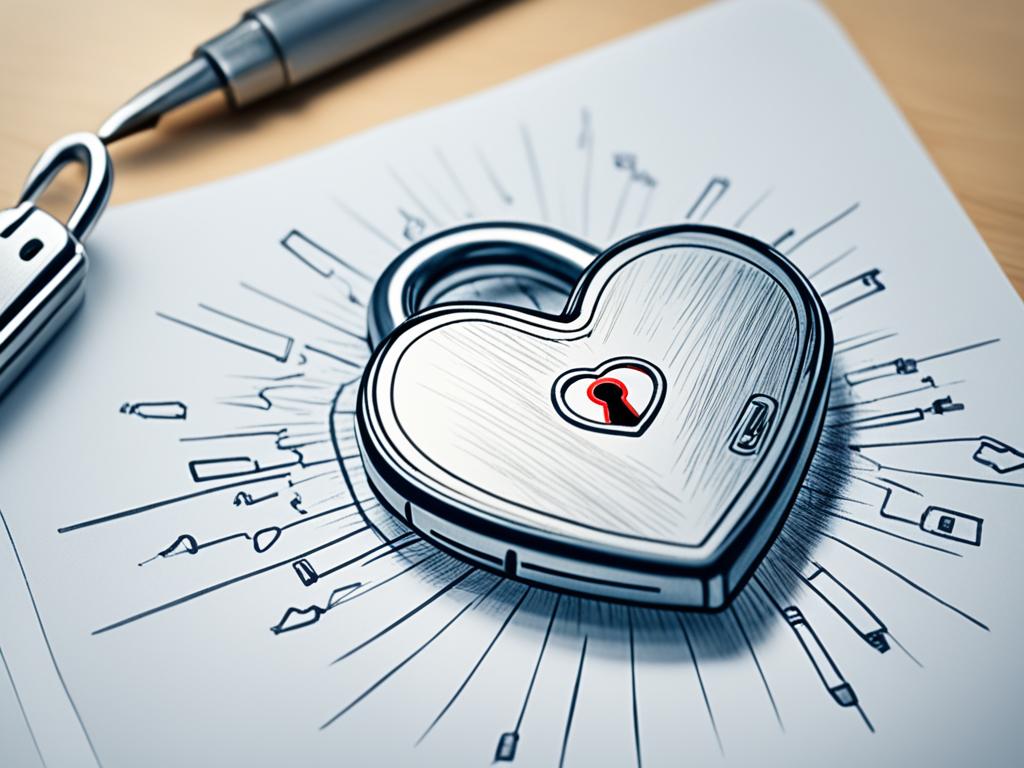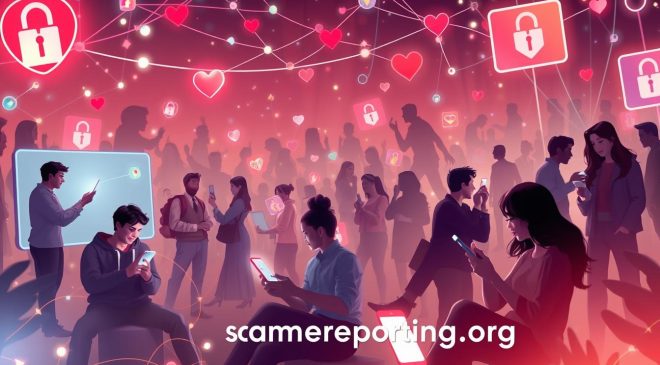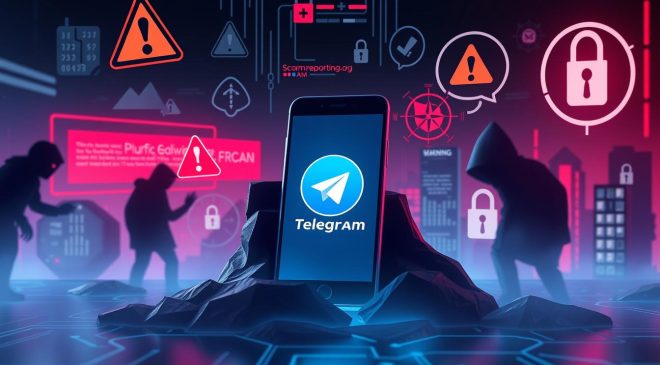
Did you know nearly 6,000 suspicious links were found in just one year? This shows a big increase in online threats. As more people date online, the risk of falling into romance scams grows.
Now, finding love online is common. But, it also brings risks like online dating fraud. Scammers pretend to be safety services to trick people.
Online dating has led to more financial fraud. These scammers trick people by building trust and making them feel special. It’s important to know about these scams to avoid losing money and getting hurt.
Key Takeaways
- Dating protector scams are on the rise, posing as legitimate safety services
- Scammers use emotional manipulation to build trust with their victims
- Financial losses from romance scams can be substantial
- Awareness and education are key to protecting yourself from online dating fraud
- Cybersecurity measures are crucial when engaging in online dating
Understanding Dating Protector Scams
Dating protector scams are becoming more common in online romance. They target people’s fears and the need for safety in dating online. Let’s explore these scams and how to spot them.
Definition and Common Tactics
These scams trick people by pretending to be security services for online daters. They use fear to make victims pay for fake protection. They often create fake profiles for security companies and push users to act fast.
Red Flags to Watch For
It’s important to know the warning signs to stay safe. Be cautious of unsolicited messages from supposed security services. Be careful if they rush you to make decisions or ask for personal and financial details. If someone says your dating profile is in danger, check with the platform directly.
Psychology Behind These Scams
Understanding scammer psychology helps us avoid these scams. These fraudsters use common human feelings:
- Loneliness
- Fear of online dangers
- Desire for companionship
- Trust in authority figures
They use these feelings to trick victims into paying for services that don’t exist.
| Scam Tactic | Psychological Trigger | How to Protect Yourself |
|---|---|---|
| Urgent security threats | Fear | Verify claims with dating platform |
| Exclusive protection offers | Desire for safety | Research company credentials |
| Emotional manipulation | Loneliness | Seek support from friends/family |
The Rising Threat of Online Dating Fraud
Online dating fraud is becoming a big problem. In the last five years, cases of online dating scams have jumped by 70%. This includes a huge 50% increase in the past year for people aged 25-35.
Not just one platform is affected by this rise in scams. Dating apps have seen a massive 86% increase in fraud since 2019. Sadly, it’s believed that 1 in 10 dating profiles might be fake, made by scammers.
| Demographic | Risk Factor |
|---|---|
| Women | 20% more likely to be victims |
| Women aged 40-59 | 53% of all victims |
| Military impersonation scams | 60% of reported cases |
Victims of these scams have lost a huge $304 million in the past year. The US has seen a 15% higher rate of financial loss compared to Europe. Sadly, only 15-20% of victims report these crimes, leaving many cases unaddressed.
As online dating grows, so does the trickery of scammers. With 35% of fraud cases tied to organized crime groups, it’s vital to be alert and informed. This way, you can protect yourself in the digital dating world.
How Dating Protector Scams Operate
Dating protector scams are getting smarter, using sneaky ways to trick people. They target those looking for love online, building trust and playing on feelings.
Initial Contact and Grooming Techniques
These scams start with unwanted messages or friend requests on dating sites. They make fake profiles with good-looking pictures and stories to catch victims’ attention. They study their targets to match their interests and likes.
Building Trust and Emotional Manipulation
After making contact, scammers work on building trust by talking a lot. They use emotional tricks to make victims feel close, sharing personal tales and deep feelings. This can take a long time, slowly weakening the victim’s guard.
The “Protection Fee” Pitch
The scam ends with a demand for fake protection services. Scammers say these services are key for safe dating online, citing false dangers. They push victims to pay “protection fees” to keep the relationship, using fear or threats to make them comply.
| Scam Stage | Tactics Used | Red Flags |
|---|---|---|
| Initial Contact | Unsolicited messages, fake profiles | Too good to be true profiles, immediate intense interest |
| Trust Building | Frequent communication, shared interests | Reluctance to video chat, inconsistent stories |
| Emotional Manipulation | Love bombing, creating dependency | Rapid declarations of love, isolation from friends/family |
| Protection Fee Pitch | Urgency, fear tactics | Requests for money, pressure to act quickly |
Spotting Fake Dating Protection Services
Fake security companies and fraudulent dating services are on the rise. In 2023, elder fraud alone resulted in over $3.4 billion in losses. To protect yourself, learn to spot these scams.
Real dating platforms usually have safety features at no extra cost. Be wary of third-party services that promise more protection for a fee. These are often scams.

- Lack of verifiable business information
- High-pressure sales tactics
- Unrealistic guarantees
- Requests for personal or financial data
Scam detection is key in online dating. Remember, if an offer seems too good to be true, it likely is. Trust your gut and research before getting involved with any dating protection service.
| Legitimate Services | Fraudulent Services |
|---|---|
| Verifiable business information | Vague or missing contact details |
| Clear, realistic promises | Unrealistic guarantees |
| No pressure to purchase | High-pressure sales tactics |
| Built-in platform features | Third-party “premium” protection |
Stay informed and watchful to avoid these scams. Your safety in online dating starts with knowing the risks.
Legal Implications of Dating Protector Scams
Dating protector scams are illegal in the United States. They fall under the Computer Fraud and Abuse Act and Wire Fraud statutes. As more people report online fraud, law enforcement is fighting back.
Current Laws and Regulations
Cybercrime laws protect people from online scams. The U.S. has rules against digital fraud, including dating protector scams. These laws help catch and punish scammers and protect victims.
Reporting Mechanisms
If you’ve fallen victim to a dating protector scam, report it to the FBI’s Internet Crime Complaint Center (IC3). This system tracks and investigates cybercrimes. You can also report to local police.
Challenges in Prosecution
Prosecuting international scams is hard. Scammers often cross borders, making it tricky to catch them. The internet’s anonymity makes it hard to find and stop scammers. But, law enforcement is finding new ways to fight dating protector scams.
“U.S. consumers reported losing more than $10 billion to fraud in 2023 according to the Federal Trade Commission.”
This huge loss shows we need better cybercrime laws and reporting systems. As scams get smarter, working together across borders is key. It helps protect people and catch scammers.
Protecting Yourself from Dating Scams

Online dating safety means being careful and smart. Start by checking profiles on your own. Don’t just trust what you see on dating sites. Use social media and other online sources to learn more about potential matches.
Never send money to someone you don’t know, even if their story pulls at your heartstrings. Scammers use emotional tricks to ask for money. Real people won’t ask for money early on.
Keep your personal info safe. Be careful with your address, bank details, and social security number. Protecting your digital identity is key to scam prevention.
Pick dating sites that care about safety. Look for ones with profile checks and secure messaging. These features help keep you safe online.
- Regularly update your privacy settings on dating apps and social media
- Be aware of common scam tactics, such as love bombing or urgent requests for help
- Trust your instincts – if something feels off, it probably is
- Use video calls to verify a person’s identity before meeting in person
Follow these tips and stay updated on scam prevention. This way, you can enjoy online dating safely and protect your money and well-being.
The Role of Dating Platforms in Combating Scams
Dating platforms are now working hard to protect you from scams. They’re adding new features to keep you safe as you look for love online.
Security Measures Implemented by Major Sites
For many platforms, dating app security is a key focus. They use AI to find potential scammers. Some sites even offer two-factor authentication to secure your account.
User Verification Processes
User verification is getting more common. Many apps now ask for a selfie to prove you’re real. This helps remove fake profiles and keeps the dating pool true.
Reporting and Blocking Features
Scam reporting tools are key for your safety. Most platforms make it easy to report suspicious behavior. You can also block users who make you feel uneasy.
| Security Feature | Percentage of Major Dating Apps |
|---|---|
| AI Scam Detection | 85% |
| Photo Verification | 70% |
| Two-Factor Authentication | 60% |
| User Reporting Tools | 95% |
Even with these steps, staying alert is still key. In 2020, romance scams took $304 million from U.S. consumers. Always listen to your instincts and use the safety tools your dating app offers.
Recovery and Support for Scam Victims
Falling victim to a dating protector scam can be really tough. But, there is help out there. Groups like the AARP Fraud Watch Network offer support and advice for those affected. These services are key in helping you deal with the fraud aftermath.
Getting your money back is often a main goal for victims. First, talk to your bank to dispute any charges and lock down your accounts. You might be able to get back some or all of your money. It’s vital to act fast to boost your chances of getting your money back.
But, it’s not just about the money. Emotional healing is just as crucial. Many victims find help through counseling or support groups for fraud victims. These places offer a safe space to share stories and learn how to cope.
| Impact of Scams | Statistics |
|---|---|
| Elder Fraud Losses (2023) | $3.4 billion |
| Increase from Previous Year | 11% |
| Sense of Security with Protection | 67% |
Remember, you’re not facing this alone. Contact local support services for help tailored to you. With the right support and tools, you can bounce back from this tough time.
Educating Others: Spreading Awareness
It’s crucial to teach others about dating protector scams to keep communities safe. As scam awareness grows, understanding its effects is key. The IRS notes a big increase in phishing scams and identity theft, showing we need better cybersecurity education.
Community outreach programs
Local police and consumer protection groups run safety programs. These programs teach you how to spot and dodge dating scams. Joining them helps you learn how to protect yourself and others from online fraud.
Online resources and support groups
Websites like ScamWatch and Romance Scams Now have lots of info and support for scam victims. They’re safe places for people to share stories and get advice. Knowing what to watch out for is your strongest defense against scammers.
Partnering with law enforcement
Dating sites, police, and cybersecurity companies are teaming up to fight online dating fraud. They use advanced tech and AI to spot scam patterns. Together, they’re working to make online dating safer for everyone.
FAQ
What are dating protector scams?
Dating protector scams are when fraudsters pretend to be security services for people looking for love online. They trick those who are lonely by offering fake protection services for money.
What are some common tactics used in dating protector scams?
Scammers often make fake security company profiles. They use fear to control people, contact them without permission, push for quick decisions, and ask for personal or financial details.
What are some red flags to watch for in dating protector scams?
Be careful if you get unsolicited contact or feel rushed to make decisions. Watch out for requests for your personal or financial info. Also, be wary of companies without clear credentials or business info, and sales tactics that feel too intense.
How can I protect myself from dating scams?
To stay safe, check profiles on your own and never send money to people you don’t know. Be careful with your personal info. Use trusted dating sites with strong security. Keep your privacy settings up to date, and know the common tricks scammers use.
What are some legal implications of dating protector scams?
These scams can break cybercrime and fraud laws, like the Computer Fraud and Abuse Act and Wire Fraud statutes in the US. Victims can report these to the FBI’s Internet Crime Complaint Center (IC3).
What are some challenges in prosecuting dating protector scams?
It’s hard to catch these scammers because they often hide online and cross state lines. It’s also tough to find and identify the people behind these crimes.
What security measures are dating platforms implementing to combat scams?
Big dating sites are fighting back with advanced security tools. They use AI to spot scams, verify photos, improve reporting tools, add two-factor authentication, and teach users about scams.
How can victims of dating protector scams seek support?
Victims can get help from groups like the AARP Fraud Watch Network, local support services, counseling, or fraud survivor groups. They can also work with banks to dispute charges or freeze accounts.
What resources are available to raise awareness about dating protector scams?
There are community programs by police or consumer protection agencies, online tools like ScamWatch and Romance Scams Now, and partnerships between dating sites, law enforcement, and cybersecurity experts.


